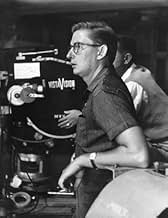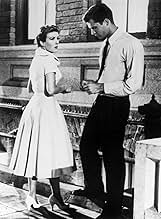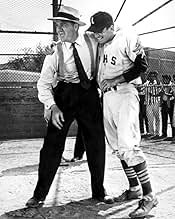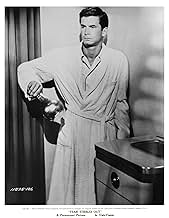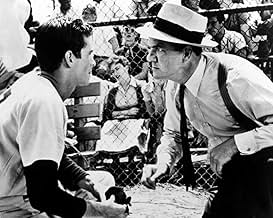VALUTAZIONE IMDb
6,9/10
2191
LA TUA VALUTAZIONE
Aggiungi una trama nella tua linguaTrue story of the life of Jimmy Piersall, who battled mental illness to achieve stardom in major league baseball.True story of the life of Jimmy Piersall, who battled mental illness to achieve stardom in major league baseball.True story of the life of Jimmy Piersall, who battled mental illness to achieve stardom in major league baseball.
- Premi
- 1 candidatura
John Aberle
- Ballplayer
- (non citato nei titoli originali)
Eric Alden
- Policeman
- (non citato nei titoli originali)
Heather Ames
- Nurse
- (non citato nei titoli originali)
Sam Balter
- Broadcaster
- (voce)
- (non citato nei titoli originali)
Mary Benoit
- Nurse
- (non citato nei titoli originali)
John Benson
- Reporter
- (non citato nei titoli originali)
Don Brodie
- Reporter Evans
- (non citato nei titoli originali)
Richard Bull
- Reporter Slade
- (non citato nei titoli originali)
Bart Burns
- Joe Cronin
- (non citato nei titoli originali)
Edd Byrnes
- Boy in Car Assisting Jimmy Up Stairway
- (non citato nei titoli originali)
Wade Cagle
- Intern
- (non citato nei titoli originali)
Keith Coyne
- Baby
- (non citato nei titoli originali)
Trama
Lo sapevi?
- QuizThe real Jimmy Piersall disowned the movie due to its distortion of the facts. Based on the success of his autobiography and the movie, Piersall penned a second book in 1985 called The Truth Hurts, which detailed his ousting from the White Sox organization.
- BlooperClose-up shots of Jimmy Piersall playing shortstop and right field reveal a low outfield wall backed by trees in the background. These games were supposed to be in Fenway Park, which would have a high left field wall and bleachers in right field.
- Citazioni
Jim Piersall: I don't care what happens. I love you Mary!
- ConnessioniFeatured in Diamonds on the Silver Screen (1992)
Recensione in evidenza
This is not what one would call a pleasant film to watch particularly about Baseball. It tells the true story of former major league ball player Jim Piersall of the Boston Red Sox and his eventual mental breakdown. While certain events are not exactly the way they took place the story nonetheless sticks pretty much to fact. Anthony Perkins puts in a dynamic performance as Piersall. A kid who likes baseball but is driven to madness by his domineering perfection minded father played by Karl Malden. Also included in the cast is Norma Moore as Jims devoted wife Mary and Adam Williams as the psychiatrist Doctor Brown.
The first half of the picture deals with Piersall growing up practicing and playing baseball always under the scrutiny of his father. Whatever Jim did on the playing field it could always have been done better according to his Dad. The second half of the film deals with Piersalls mental breakdown and subsequent treatment and recovery. While watching a ball game on TV he makes remarks that his doctor picks up on and uses to unlock the reason why he cracked up. These same circumstances are no doubt still occurring today as many parents push their children relentlessly in everything from sports to academics to beauty pageants. Jim Piersalls story fortunately became a book and later this fine film that perhaps has and will continue to serve as a message to those who watch it. Whether you're a baseball fan or not this is a movie to be seen.
The first half of the picture deals with Piersall growing up practicing and playing baseball always under the scrutiny of his father. Whatever Jim did on the playing field it could always have been done better according to his Dad. The second half of the film deals with Piersalls mental breakdown and subsequent treatment and recovery. While watching a ball game on TV he makes remarks that his doctor picks up on and uses to unlock the reason why he cracked up. These same circumstances are no doubt still occurring today as many parents push their children relentlessly in everything from sports to academics to beauty pageants. Jim Piersalls story fortunately became a book and later this fine film that perhaps has and will continue to serve as a message to those who watch it. Whether you're a baseball fan or not this is a movie to be seen.
I più visti
Accedi per valutare e creare un elenco di titoli salvati per ottenere consigli personalizzati
Dettagli
- Data di uscita
- Paese di origine
- Lingua
- Celebre anche come
- Fear Strikes Out
- Luoghi delle riprese
- Azienda produttrice
- Vedi altri crediti dell’azienda su IMDbPro
- Tempo di esecuzione1 ora 40 minuti
- Colore
- Proporzioni
- 1.85 : 1
Contribuisci a questa pagina
Suggerisci una modifica o aggiungi i contenuti mancanti

Divario superiore
By what name was Prigioniero della paura (1957) officially released in Canada in English?
Rispondi

